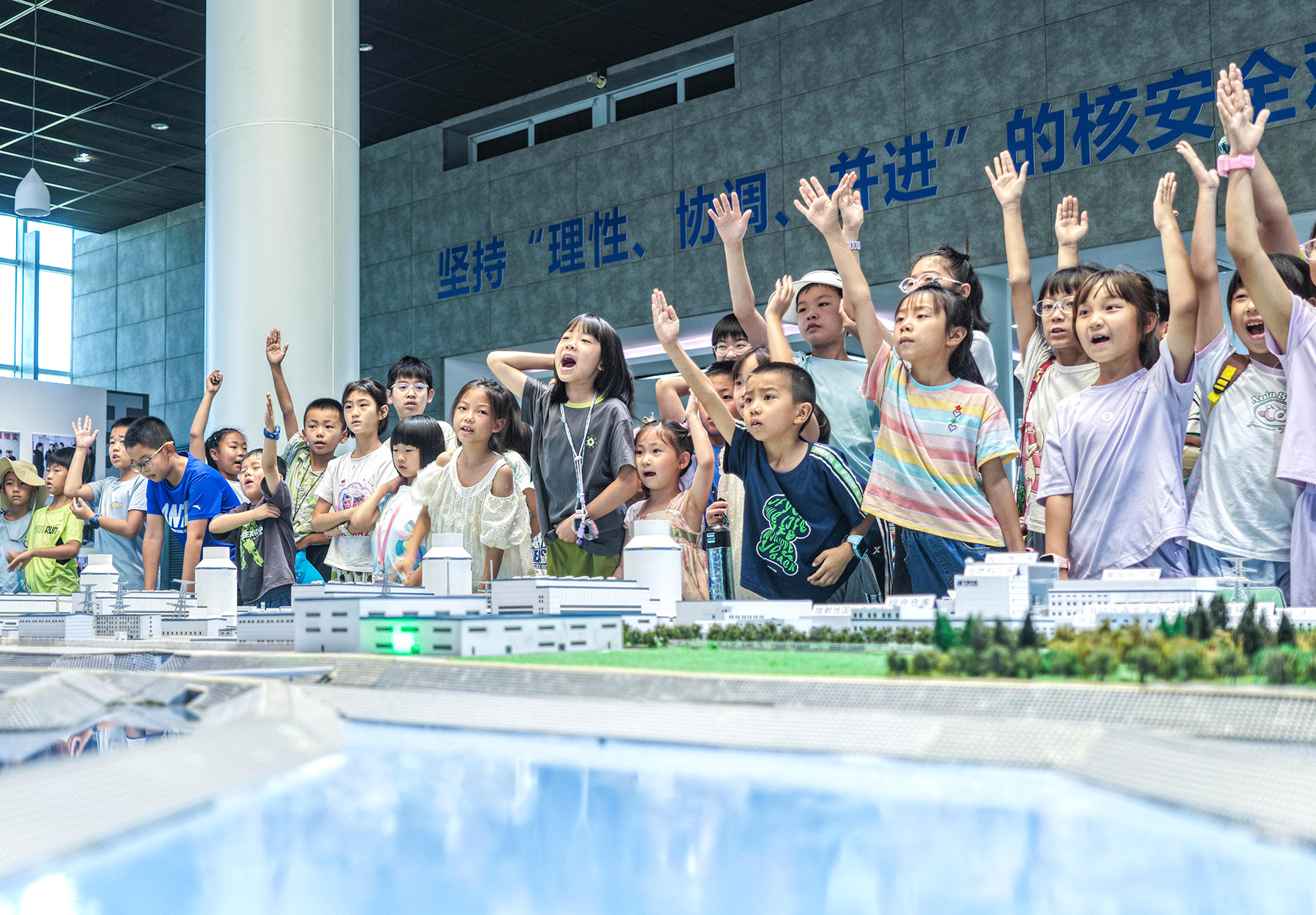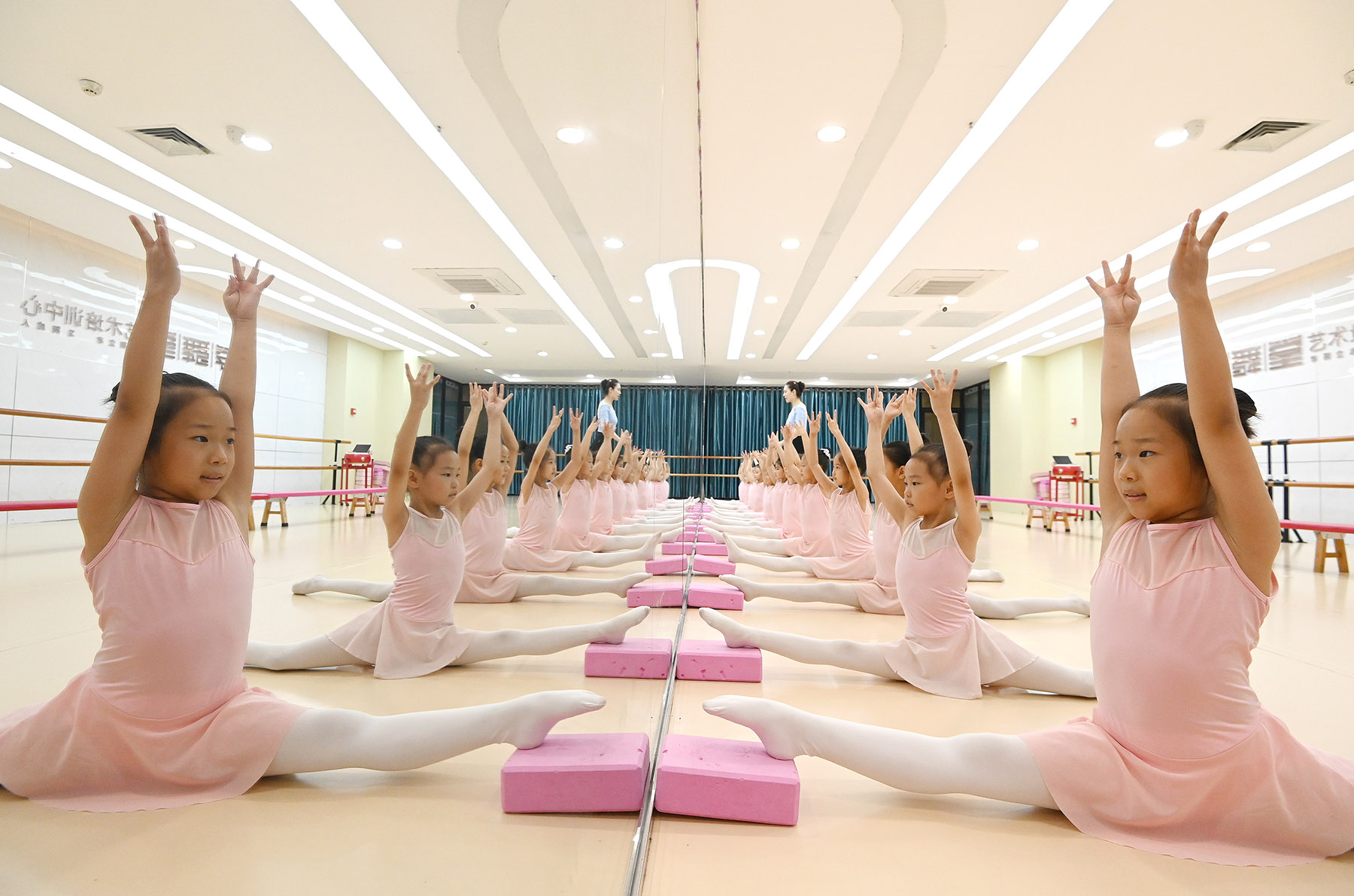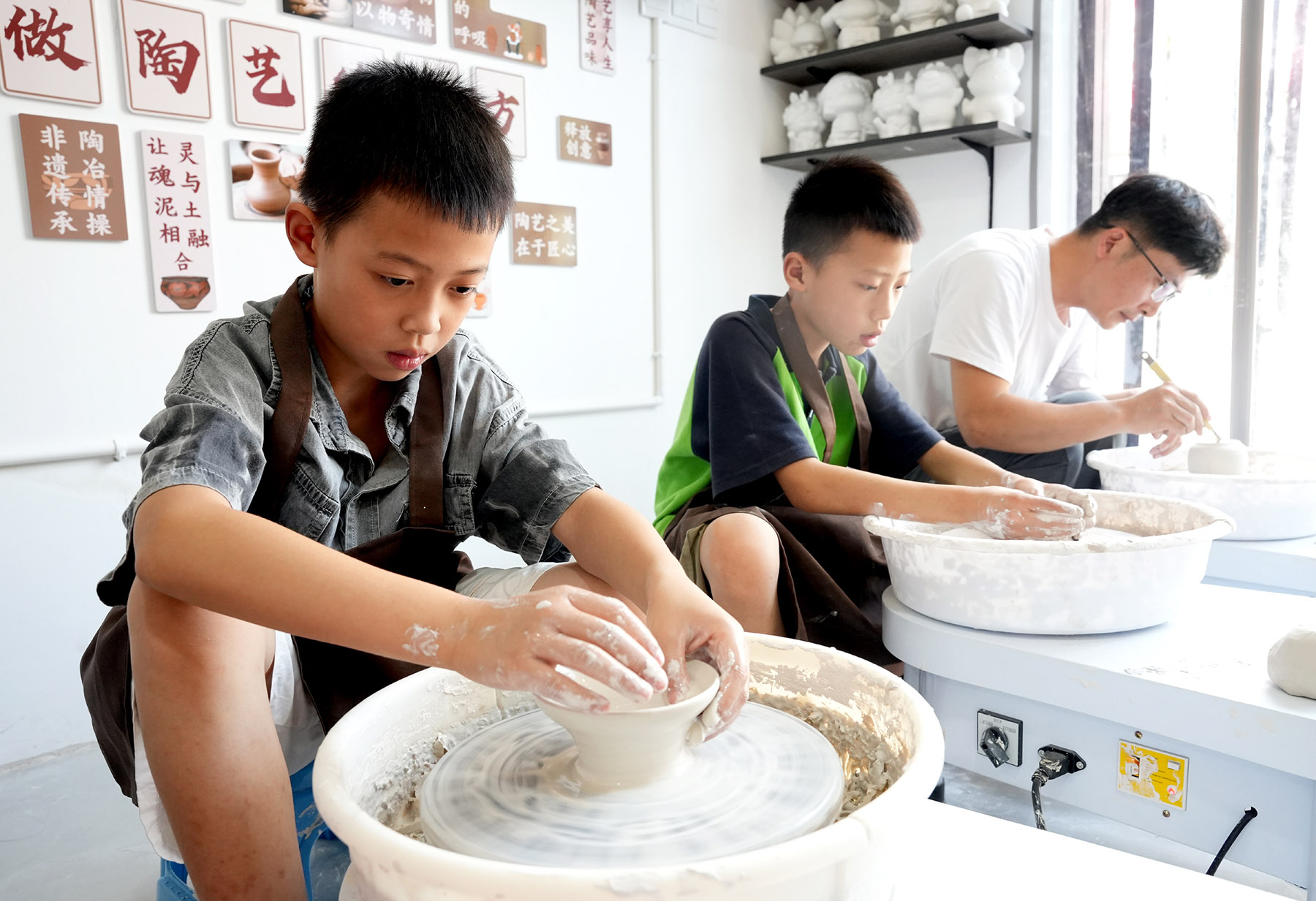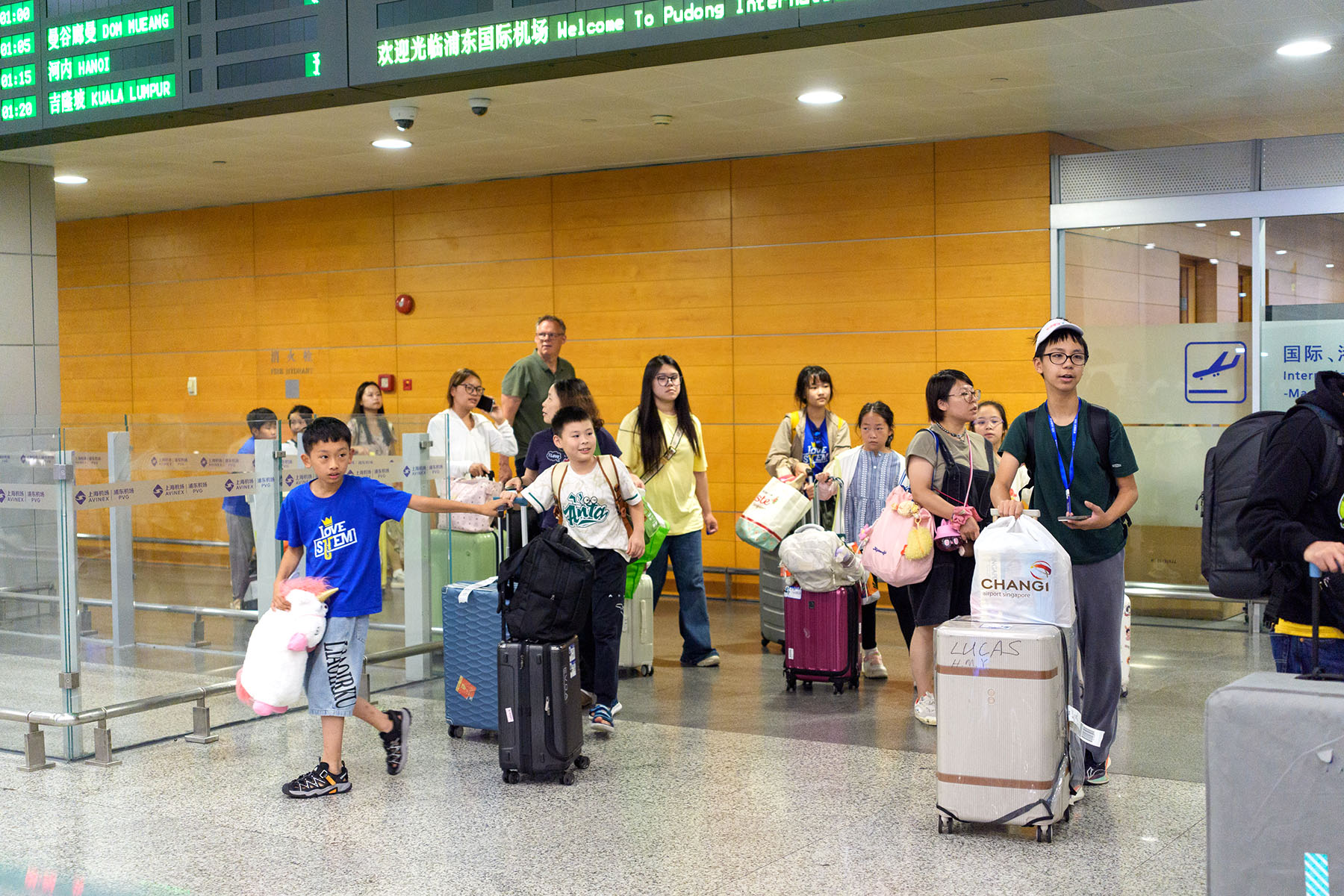While many parents believe in holiday study programs, experts argue children need free time to develop

Even before the summer holiday kicked off in July, Shanghai mother Shen had planned her 12-year-old daughter Mengmeng's daily schedule — tutoring, homework, extracurricular classes and physical exercise.
The daily timetable, containing the smallest details, runs from 7 am to 10 pm and includes five-minute breaks to allow the girl to rest her eyes.
Mengmeng attends one-on-one tutoring sessions in math, physics and English for two hours each on Mondays, Wednesdays and Fridays until dinnertime.
On Tuesdays, Thursdays and Saturdays, she revises the previous day's lessons. To ensure her daughter doesn't waste time at home, Shen often takes Mengmeng to the office with her to supervise her homework.
ALSO READ: China launches national child subsidy program
Like many parents, Shen has high hopes for her child's academic performance, aiming for Mengmeng to excel and secure a place in a prestigious high school after taking the entrance exam in three years.
"Physics, which starts in eighth grade, is challenging," said Shen, 39. "My daughter will be in the seventh grade in September, but I feel it is necessary for her to learn in advance. If Mengmeng forgets what she learns this summer, I will send her to learn it once again next summer," she added.

Daydream believers
Shen's attitude to her child's education is typical of many Chinese parents. They value diligence and studiousness, believing that if children do not spend most of their free time learning, they are wasting opportunities to secure a bright future.
However, a news conference organized by the Shanghai Municipal Health Commission at the end of June emphasized the importance of allowing children appropriate free time during the summer holiday. Experts suggested that parents should allow their children to do their own activities — even if it is daydreaming, doodling, or doing nothing — and reduce excessive parental intervention.
Free time has numerous benefits for children, such as stimulating creativity, developing problem-solving skills, and enhancing a child's ability to cope with negative emotions, according to experts.
"Giving children free time means letting them decide what to do for themselves. This kind of self-driven decision-making is more important than completing tasks assigned by parents. Children have the opportunity to think, decide, try, and adjust based on their own desires and interests," said Huang Xiang, a doctor at the neurosurgery department of Shanghai Huashan Hospital Affiliated to Fudan University.
"Such experience is about developing self-management skills and, on a larger scale, developing a form of independent thinking that allows individuals to explore, satisfy, and develop themselves based on their feelings, needs, and current resources rather than passively completing orders by others and waiting for rewards," he said.
Experts said helping children build such abilities will benefit them for their entire life. However, today's society, where children are often forced into "involution-style competitions", prevents some youngsters from enjoying free time.
Skating ahead
Mengmeng is in a top class at a prestigious middle school in Shanghai's Pudong New Area, where a competitive academic atmosphere prevails in the classroom.
Her mother Shen said the school does not require students to take extra classes in the summer holiday. On the contrary, teachers suggest the students go on vacation.
"But I think there is no way out but to learn as much as possible. I worry that the subject of physics will be difficult for my child, and I don't have confidence that girls can learn science well," said Shen, who changed her job from being a tour guide to a travel agency administrative position to better support her daughter's educational pursuits.
Mengmeng has grown up under her mother's rigorous approach and seems quite obedient. She has followed a tight summer schedule since she was a small child.
When she was younger, she had more extracurricular classes to attend. But now she has narrowed it down to four: piano, drawing, badminton, and swimming. During elementary school, her summer holiday and weekends were also filled with figure skating and ballet classes.
"The premise of giving children free time is self-discipline, which is hardly seen from children," said Shen. "If left with free time they will resort to using electronic devices with no exceptions," she said, adding that she and her husband, who have no hobbies, spend almost all their salaries on raising their child.
Mengmeng is not opposed to having a full schedule. She said acquiring knowledge of physics is "quite enjoyable", adding that math lessons have improved her problem-solving speed and boosted her grades.
Of all the extracurricular activities, figure skating is her favorite.
"But due to a scheduling conflict and my mother's insistence that playing the piano is elegant for girls, there leaves no time for figure skating," she said, explaining that learning figure skating changed her perception of the sport from terrifying to beautiful. Mengmeng also said she feels a surge of dopamine when she figure skates.
Her mother said: "Everyone understands the importance of ensuring happiness for children, but the overall environment of fierce competition pushes children and parents forward together".

Anxiety, shame
Experts warned that over organizing children can lead to high levels of anxiety in the future, as they may struggle with downtime and feel pressure to be constantly productive.
"Being accustomed to being scheduled without breaks will lead to such individuals feeling uncomfortable whenever they are idle," said Jin Jin, a Shanghai Mental Health Center doctor. "They won't let themselves have any free time and feel unworthy, or even have a sense of shame, about enjoying it."
These children may also feel anxious that their parents will urge them to do something. "They can only follow in a passive way doing whatever they are told to do," Jin said.
The other extreme is that these children will eventually give up on developing themselves. In either case, they lose the ability to plan their own use of time, Jin said.
Huang, the doctor from Shanghai Huashan Hospital, said human creativity is actually a result of synthesizing different information in a person's daily life. "When seemingly in a daze, people will sort out all their knowledge and experiences of the day. When the brain combines these different elements, people sometimes have new creative ideas," he said
Psychological research shows that giving children free time in moderation is important for their development. When the brain is at rest, it does not really stop working, but begins to engage in another form of thinking — particularly about social cognition and self-reflection.
"Free time also fosters mental toughness and helps individuals bounce back from setbacks because they have the time to recover. This is a trait that people with free time have when they grow up, and it benefits overall personality development," Jin said.
Enjoyable activities
When children are given free time, they develop a strong sense of self-efficacy — a person's belief in their ability to complete a task or achieve a goal. They work harder as they know they are working for themselves, rather than being forced to do something for others, several experts said.
Wu Tingting is the mother of a 10-year-old boy in Shanghai. She said she can sense the development of his self-efficacy when he engages in activities he enjoys, such as conducting physics and chemistry experiments with apparatus or building Lego sets.
"He becomes deeply immersed in those activities and improves as he continues. In contrast, when it comes to completing certain school assignments, I have to urge him repeatedly to do them and he often drags his feet," said Wu, an elementary school teacher.
Wu agrees with leaving free time for children. She believes in a balanced holiday schedule for children, consisting of equal parts of learning and leisure time. While she does not oppose her child engaging in scientific experiments, she considers playing with water guns a waste of time.
With her dual roles as a mother and a teacher, Wu said she feels more lenient toward her students but stricter with her own child, as she has higher expectations for him.
"Despite knowing the distinct roles of home and school — where home provides love and support and school focuses on education — I find it challenging in practice not to push my son to study," she said.
Sun Jinhua, director of the mental health department at the Children's Hospital of Fudan University, said intensive learning schedules not only eat into children's rest time, but also diminish their interest in new subjects when school resumes.
He said many middle school students who seek medical assistance from the department suffer from emotional disorders. These often stem from being overloaded with study during primary school years, leading to boredom and even fear of learning. Typical symptoms include insomnia, loss of emotional control, and refusing to go to school, as well as physical ones such as headaches and chest tightness.
"For such children, excessive study time can be likened to overeating. Just like those who overeat vomit and lose interest in food, excessive studying can lead to loss of interest in learning," Sun said.

What's on your mind?
Parent-child communication plays a crucial role in the process of a child's growth, experts said. When it comes to extra classes, parents must respect the child's academic needs, interests, and wishes.
"Some parents discuss course enrollment matters with their child, while also considering the child's ability to handle pressure. However, others disregard their child's willingness to enroll, and force them to take classes simply because the neighbor's child achieved good results," Sun said, adding that a good relationship is important for a child to be willing to listen to parental advice.
Children who spend a lot of time in tutoring institutions may lose time for parent-child interactions, which can lead to distant relationships, he warned.
"Sending a child to tutoring classes lasting an entire day seems to lighten parents' burden, but it means giving up the opportunity to build an intimate relationship with their child for time spent with teachers," said Sun.
Many families focus on pushing their child to improve their academic performance because they define success narrowly, some sociologists said. However, parents should not force their child to learn things against their will, and should allow for different development paths, they said.
Huang said every child has a different direction in life, and the development of society and national strength require a diversity of talent. Some children may not be suited for STEM learning or research, but they can explore other fields and make contributions to society.
ALSO READ: China announces phased implementation of free preschool education
Jin suggested that parents should spend more time and energy on self-improvement rather than interfering with their children's choices. Moreover, they should avoid frequently using discouraging words, which stems from a lack of trust in a child.
She said no one inherently desires to be unsuccessful, and just like lions in the wild, everyone desires "good hunting and health". However, if a child is constantly criticized, they may start believing they are not good at anything, hindering their natural inclination to excel. That child will eventually lose confidence and give up on themselves, she said.
"It's so important that parents have belief in their children to follow their own paths to have a good future. Whether they become a chef or a flutist, there'll be opportunities," said Jin.
"By instilling confidence in their children and recognizing their inherent abilities, children will learn to manage themselves. Such empowerment will naturally lead to their vitality, allowing them to grow into individuals who are admired, kind, capable, and empathetic," she said.
Contact the writer at zhouwenting@chinadaily.com.cn


